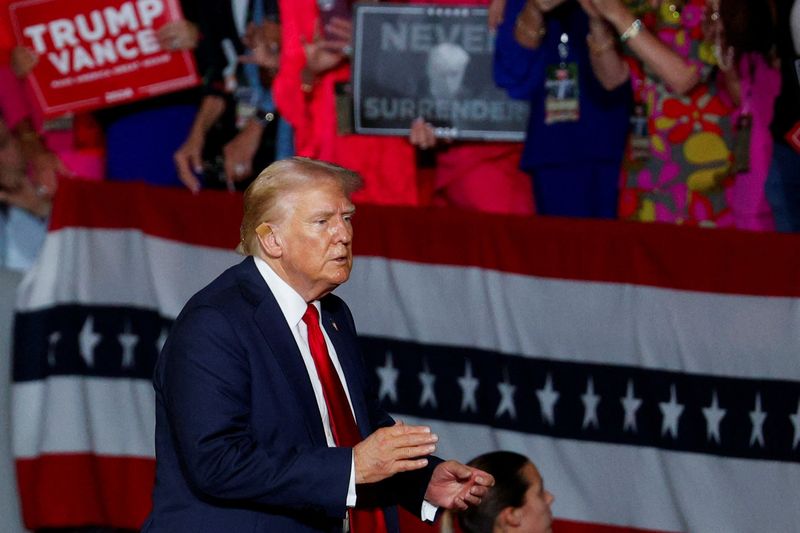By Michael S. Derby
NEW YORK (Reuters) - The Federal Reserve’s battle to get inflation under control likely faces fresh challenges should Donald Trump regain the White House, a dynamic that could put the U.S. central bank back in the former Republican president's crosshairs.
A wide range of economists see Trump's tariff agenda, coupled with aims to deport millions of undocumented workers and the likelihood of expanded deficits, reigniting price pressures that are now easing and likely driving the Fed to react with more restrictive monetary policy than is now penciled in.
Forecasters predict Trump's plan to impose 10%-across-the-board tariffs on imported goods - and even higher rates on Chinese products - would generate a one-time surge in inflation, while deportations would drive up wages for remaining workers, adding to the pressure.
An Oxford Economics model which looks at the likely policy stances of the candidates, for instance, predicts that under a second Trump administration an inflation measure excluding food and energy prices tracked closely by the Fed would peak between 0.3 and 0.6 percentage point above what would be expected under current appropriations law and policy.
That compares with potential excess inflation of between 0.1 and 0.2 percentage point under a Democratic administration led by Vice President Kamala Harris, the presumptive nominee now that President Joe Biden has dropped out of the race. Oxford and others see Harris largely continuing Biden's economic policies.
'LEAGUES AWAY'
Resurgent inflation would be a setback for the Fed, which after aggressive rate rises is on the verge of quelling generation-high inflation, now retreating toward the central bank’s 2% target. Markets now project a September rate cut, with more to follow.
“The Trump economic program is inherently inflationary,” said Mark Sobel, U.S. chairman at the Official Monetary and Financial Institutions Forum and a veteran of the U.S. Treasury Department under both Democratic and Republican presidents. “Much higher tariffs, an expansionary fiscal policy and mass deportation of immigrants: All these factors would combine together to raise inflation and interest rates higher than they otherwise would be.”
Diane Swonk, chief economist with KPMG U.S., said in a note Trump's tariff increases coupled with a “sharp” curb on foreign workers means “a resurgence" in inflation which would likely force the Fed to hold rates at current levels for “much longer.”
The trade approach from Biden and Harris "remains leagues away from what Trump has been proposing regarding tariff policy," said Oscar Munoz, chief U.S. macro strategist at TD Securities. Under the anticipated "surgical" trade actions pursued by a Harris administration, he said, "we don't anticipate those policies to represent a meaningful risk for our inflation/growth forecasts."
Evercore ISI analysts believe the Fed will respond more slowly than markets to a new outlook should Trump win. But a Trump victory could see policymakers dial back some of the cuts now expected for next year, potentially even moving to pencil in a late 2025 rate hike, they said.
Asked how Trump's policy agenda would buck economists' expectations for higher inflation, Trump campaign National Press Secretary Karoline Leavitt said: "The American people don't need economists to tell them which president put more money in their pockets."
"When President Trump is back in the White House, he will reimplement his pro-growth, pro-energy, pro-jobs agenda to bring down the cost of living and uplift all Americans."
'REACTING TO A CHANGED FORECAST'
How the Fed would factor in implications of a Trump victory is unclear, but at least one former U.S. central banker believes the Fed needs to start taking it into account - even in any consideration of a near-term rate cut.
“If a Trump victory looks likely, the Fed will need to consider whether cutting based on current data makes sense if likely fiscal actions would cause them to need to reverse policy to counter the inflationary shocks if his publicly announced policies go through,” former Boston Fed leader Eric Rosengren wrote on social media site X this month. “That is not politics, it is reacting to a changed forecast.”
But Richmond Fed President Thomas Barkin cautioned against that.
“I think it'd be very hard to make policy today” against expectations of future government actions, he told reporters last week.
Meanwhile, Fed Chair Jerome Powell earlier this month declined to comment before Congress on the implications of any future policy changes like expanded tariffs.
SLOW BURN
Jason Furman, former chair of the Council of Economic Advisers in the Obama administration and now an economics professor at Harvard University, said the shift in inflation would be a bit of a slow burn. “You're not talking about 5, 6% inflation,” he said, but inflation would be higher than it otherwise would be, and monetary policy would also be tighter.
Just how a victorious Trump would respond to a Fed that curtails or even reverses any rate cuts is another wildcard. Trump during his term famously clashed with Powell, whom he appointed as Fed chief, but recently told Bloomberg he would not try to oust Powell before his term as chair expires in 2026.
Barry Eichengreen, professor of economics and political science at the University of California, Berkeley, said at an event in Peru on Friday it’s possible Trump might work to remake the Fed if it stood against the side effects of his policy choices.
“Come May 2026 President Trump would have a more straightforward option of nominating a more compliant Fed chair” who would not act to offset rising inflation pressures, in turn worsening them, Eichengreen said.

That said, investors might dramatically increase the costs of heavy-handing the Fed.
Scott Lincicome, a trade policy expert at the Cato Institute, said “you probably at the very least would see some market response to even the attempts to weaken Fed independence,” and that might prompt elected officials to reconsider such actions.
